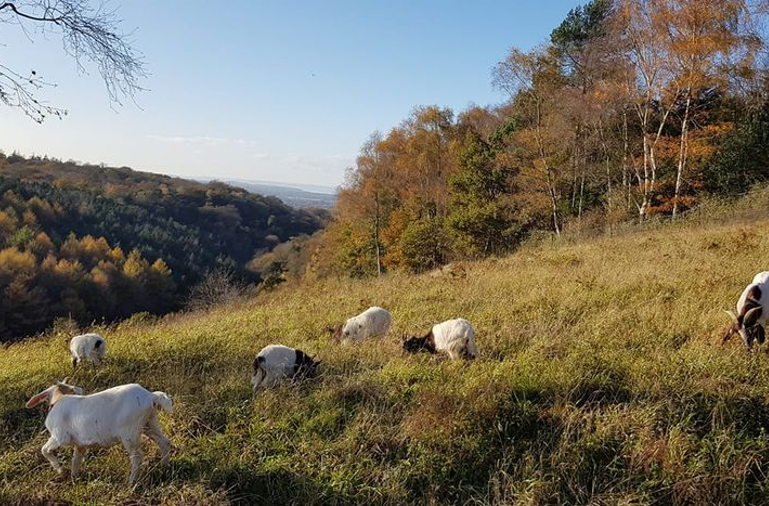A significant proportion of people are disconnected from where their food comes from. Where once there were strong relationships between farmers and consumers, many people now have little idea where the food they eat is produced or who the people are who are growing and raising it. This disconnection means that there is little understanding of agriculture or land management, and a lack of awareness about how the food we eat impacts on the environment and ecology of our land.
Faced with competition from supermarkets and cheap imported food, many farmers and producers are struggling to run viable businesses, especially those who are choosing to farm in ways which preserve the countryside and conserve nature and the environment. In addition, this lack of connection means that local producers are not being valued or supported by their community, meaning that food is often transported from further afield and abroad, leading to higher food miles and produce that isn’t as fresh or healthy.
This project, run by Bristol Food Connections, aims to reconnect people with our rural hinterland by introducing some of the farmers and food producers in and around Bristol, capturing the stories of the people who feed us and why they farm, what their life as a farmer is like, and how COVID-19 has impacted them as producers.
To learn more about some of the local producers in and around Bristol and where you can buy their produce, visit the Bristol Food Producers members page or the Bristol Food Union website.

HUMPHREY LLOYD – EDIBLE FUTURES
Humphrey started his journey into farming 10 years ago, starting out on a small piece of council land in Brislington. In 2014 he moved to the Grow Wilder site in Stapleton where he has 1.5 acres of land and two polytunnels, growing salad and mixed vegetables for direct sales to customers and restaurants. When Covid hit in 2020, Humphrey took on a three acre field where he expanded production to grow veg boxes for the local community, including providing solidarity veg boxes for refugees and asylum seekers. He has recently bought his own land in North Somerset, where he is aiming to run a market garden alongside other farms producing different produce.

CATHERINE WITHERS – YEW TREE FARM
Catherine has lived at Yew Tree Farm all her life, and the farm in South Bristol has been farmed by her family for three generations. Parts of the farm are at risk from development and Catherine is fighting hard to preserve this important farm for the next three generations. The farm is rich in wildlife, with a natural hay meadow with over 90 plant and grass species that not only feeds the animals in winter but sustains hundreds of insect and bird species as well. They have a herd of cattle, pigs and chickens, supplying produce to their local community through the onsite farm shop.

CAROL AND PHOEBE – STREET GOAT
Street Goat are an urban goat farming cooperative, whose mission is to develop a network of community projects in which local people collectively manage and care for livestock in urban areas, to produce milk, fibre and meat. They have a number of sites around the city where they run micro-dairy milking operations that provide dairy for 30 households. They also raise goats for meat on various plots of urban and peri-urban land, such as overgrown allotment land, bringing acres of allotments considered ‘unlettable’ back into use for vegetable production and carrying out conservation grazing on nature reserves. These goats are often male kids, a ‘waste’ product from dairy operations.
BERNIE WREN – BOILING WELLS LANE
Bernie is currently in his mid-eighties and has been farming in Boiling Wells for his whole life. He is the third generation of his family to farm on the land, and the land was given to his Grandfather after the First World War. He originally ran a market garden on the site, but has also run a dairy with Jersey cows, eggs and pigs (until swill feeding was made illegal in 2002).

MARY CONWAY – PURPLE PATCH
Mary started farming in St Werburghs seven years ago. She farms on around 1/3 of an acre, growing salad and mixed vegetables in a polytunnel and field. She sells her produce direct to customers through a Community Supported Agriculture model, via an onsite farm shop and to local restaurants. In addition, there are also an assortment of animals including chickens, pigs and cows on the farm.

MARK COX – BARLEYWOOD WALLED GARDEN
Mark took over the running of Barley Wood Kitchen Garden in 2009. As a deep lover of nature, Mark is committed to growing quality and delicious produce in as wholesome and holistic way possible. In 2017, he turned the garden completely over to a ‘no dig’ style of growing and has not looked back. He sells the majority of our produce in veg boxes and at farmers markets at the weekends, along with a little ‘honesty-box’ run shop on site. He also supplies The Ethicurean restaurant, within the garden walls, as well as a few other select restaurants in Bristol.
Teaser photo credit: Street Goat Facebook page.





